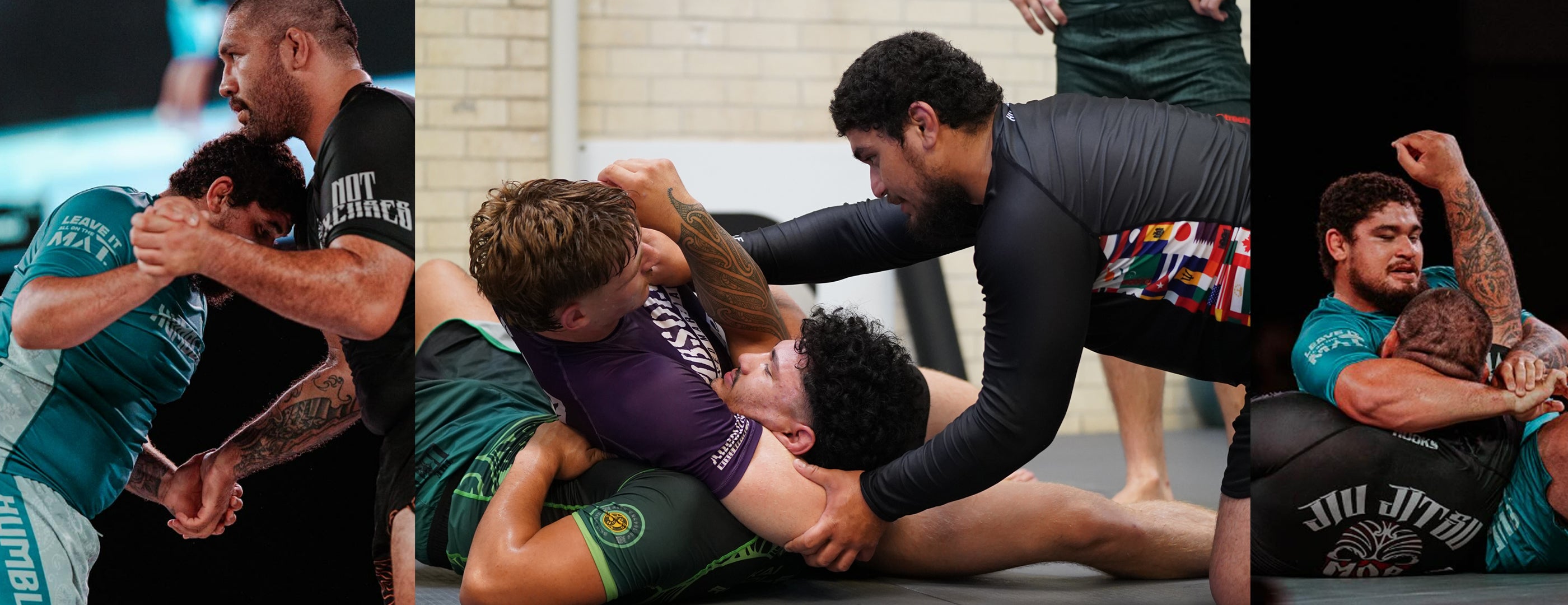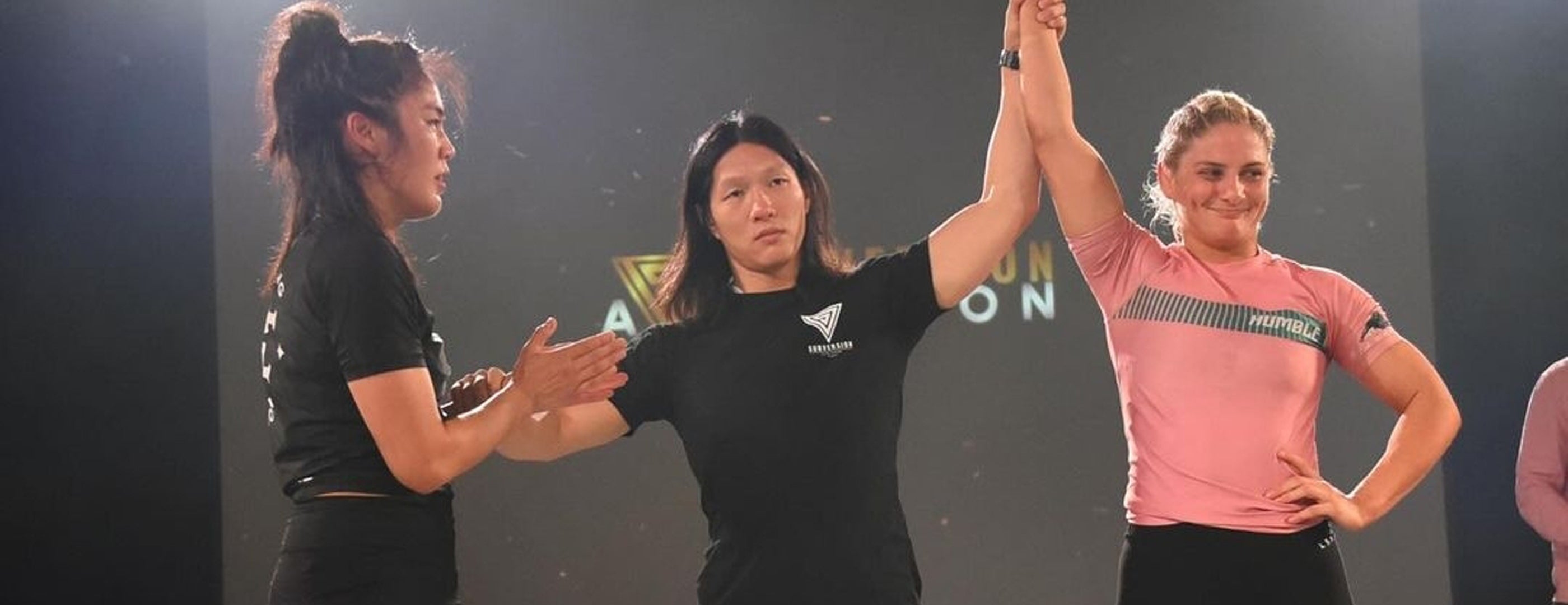
What is Brazilian Jiu-Jitsu?
Brazilian Jiu-Jitsu (BJJ) is a martial art and combat sport that focuses on ground fighting and submissions. It was developed in Brazil in the early 20th century by the Gracie family, who adapted and modified the traditional Japanese martial art of Jiu-Jitsu to make it more effective in self-defence.
Obviously, that’s not the only difference, but it is the one that catapulted BJJ to international popularity. People love BJJ for learning self-defence, but also for fitness, the community, the competition, and even for personal growth.
Humble Fightwear was started to provide BJJ practitioners of all levels with the gear they need to succeed. We love the sport, and we hope you’ll love it too. So if you’re thinking about learning BJJ, or just interested in learning more, read on!
What is Jiu-Jitsu? And What's the Difference Between Jiu Jitsu and BJJ?
Jiu-Jitsu is a traditional Japanese martial art that focuses on grappling and ground fighting. It includes techniques for striking, throws, joint locks, and submissions. Brazilian Jiu-Jitsu (BJJ) is a variation of Jiu-Jitsu that was developed in Brazil in the early 19th century.
BJJ emphasises the use of leverage and technique over brute strength, allowing a smaller person to defend against a larger opponent. It includes a wide range of techniques such as joint locks, chokeholds, and sweeps, and is known for its emphasis on ground grappling and submissions. BJJ has become a popular sport, with competitions held at the local, national, and international levels.
One of the bigger differences in Brazilian Jiu-Jitsu is there’s no striking. This alone makes BJJ more sport-oriented, and Japanese Jiu-Jitsu more focused on self-defence. Additionally, Jiu-Jitsu is quite sport focused, while many people choose to practice BJJ simply to stay fit and healthy.
Should I do BJJ or another martial art?
Really the only person who can answer this question is you. Of course, we can always give you a hand in making that decision! Here's what you need to know about BJJ compared to other martial arts, so you can decide which one is right for you.
Brazilian Jiu-Jitsu vs Karate
If you're interested in ground fighting, grappling, guarding and holding, BJJ may be the best choice for you. However, if you're more into striking and fighting standing up, Karate may be the best choice for you.
Karate is a striking-based martial art that emphasises the use of punches, kicks, strikes, and blocks. It also incorporates throws, joint locks and pressure points, but striking is the main focus. This makes it very different to BJJ, as you'll use a different set of skills and learn vastly different techniques.
Both can be effective in self-defence, but BJJ is more suited for ground fighting and close-quarters combat, while Karate is more suited for stand-up fighting and striking at a distance.
BJJ vs Jiu-Jitsu (Japanese Jiu-Jitsu)
Brazilian Jiu-Jitsu (BJJ) and Jiu-Jitsu, aka Japanese Jiu-Jitsu, both share many techniques and principles, but they have some key differences in terms of their focus, training methods, and competition.
While both make heavy use of grappling and ground fighting, Jiu-Jitsu utilises a wider range of techniques designed to take down the opponent. This can include strikes, takedowns, choke holds and joint locks, along with the grappling you'll see in BJJ. Strikes are banned in BJJ, so this is probably the biggest point of difference.
Ultimately, what's most important is that you find a style that you enjoy and that aligns with your goals.
Brazilian Jiu-Jitsu vs Muay Thai
Both BJJ and Muay Thai are fantastic options if you're looking to learn a martial art. However, they're drastically different. Where BJJ is all about grappling, Muay Thai focuses on striking your opponent while standing up. Muay Thai is also highly competitive, so if you're more interested in the fitness and personal challenge side of things BJJ may be better for you.
It ultimately depends on your personal interests and goals as to which one would be a better fit for you. If you're interested in self-defence, competition, or getting in shape, both are great options. You can always give both a try and see which one you like best!
Brazilian Jiu-Jitsu vs Judo
While both Judo and BJJ focus on grappling, the main difference between judo and jiu-jitsu is that judo focuses more on throws and pins, so you can remain standing far more often. It's also traditionally sport-oriented, and many people start training in Judo with the intention to compete.
Because they're similar, there's a lot of overlap in the skills you'll learn. In fact, if you wanted to learn one and then the other, you could make the switch pretty easily. Some people say that Judo is better for self-defence, but when it comes down to it it's the way you use your skill that makes the difference.
If you're really having a hard time deciding, start with one and then try the other! Both martial arts complement each other beautifully and you can end up with a very well-rounded skill set.
What does Brazilian Jiu-Jitsu for beginners look like?
So, you've decided to start learning BJJ. Here's what you can expect as a beginner.
Starting out with BJJ can be intimidating, especially if you've never done martial arts before. Thankfully, the system is laid out to help you grow at a pace that's right for you. As a beginner, you'll start on a white belt, then work your way through the ranks as you gain knowledge and experience, and develop your skills.
You'll start by learning the basics of the sport, such as proper posture, grips, and the basic techniques of grappling and submission. Classes may start with warm-ups and stretching, followed by instruction and drilling of specific techniques. Beginners will learn the various positions, such as guard, mount, and side control, and how to transition between them.
The training is usually done with a partner, sparring, and drilling. Safety is emphasised and students are taught how to tap out or signal submission during sparring. BJJ also places a strong emphasis on leverage and technique over brute strength, which makes it accessible to people of all sizes and strength levels.
Choosing the right instructor is important, as only a good instructor will help you grow in a way that fits you best.
One of the first things you'll learn is the importance of a humble attitude. When you're a beginner you're not going to be the best, regardless of your skill. Being able to put your ego aside and be open to constructive criticism is one of the most valuable things you'll learn while practising BJJ.


